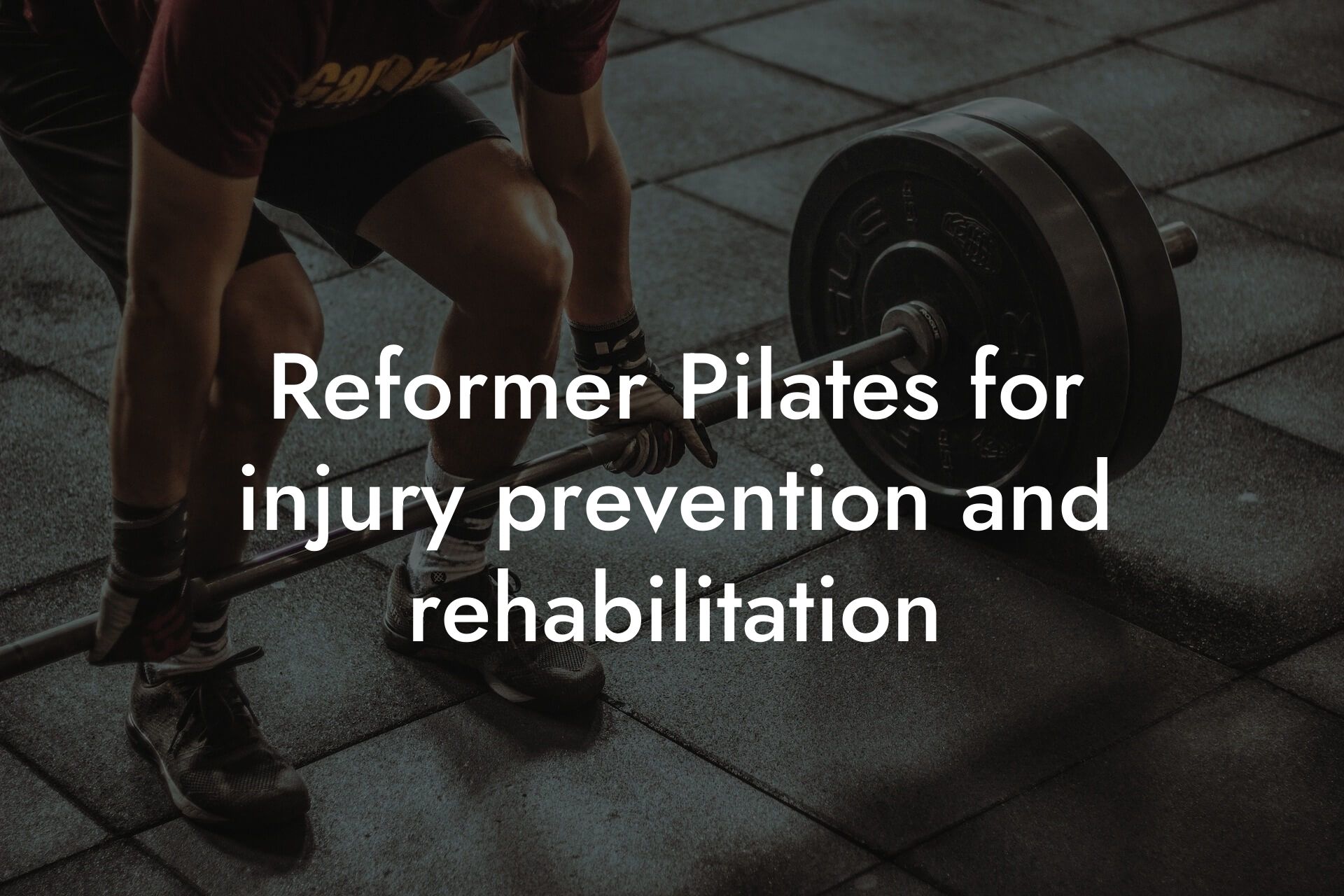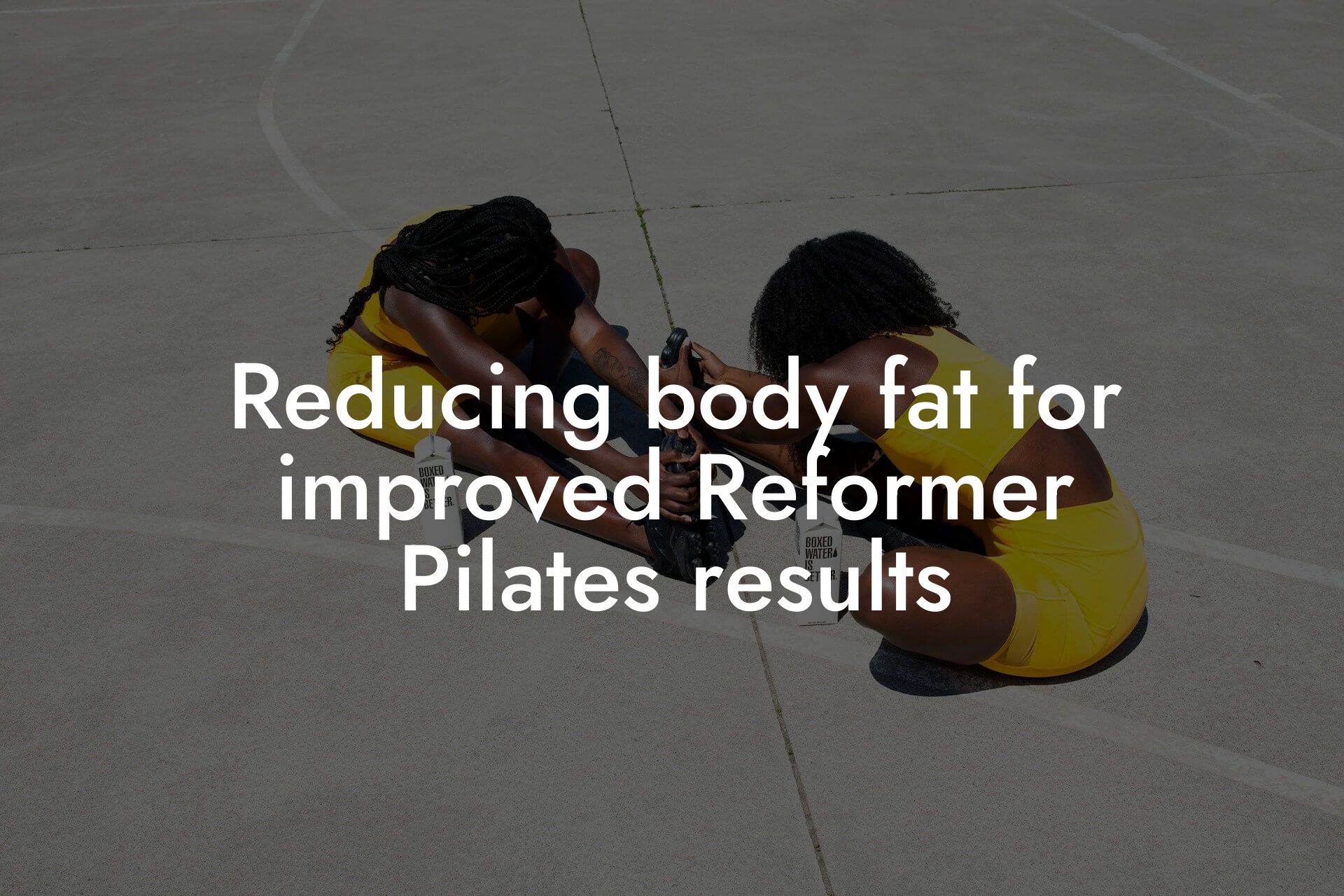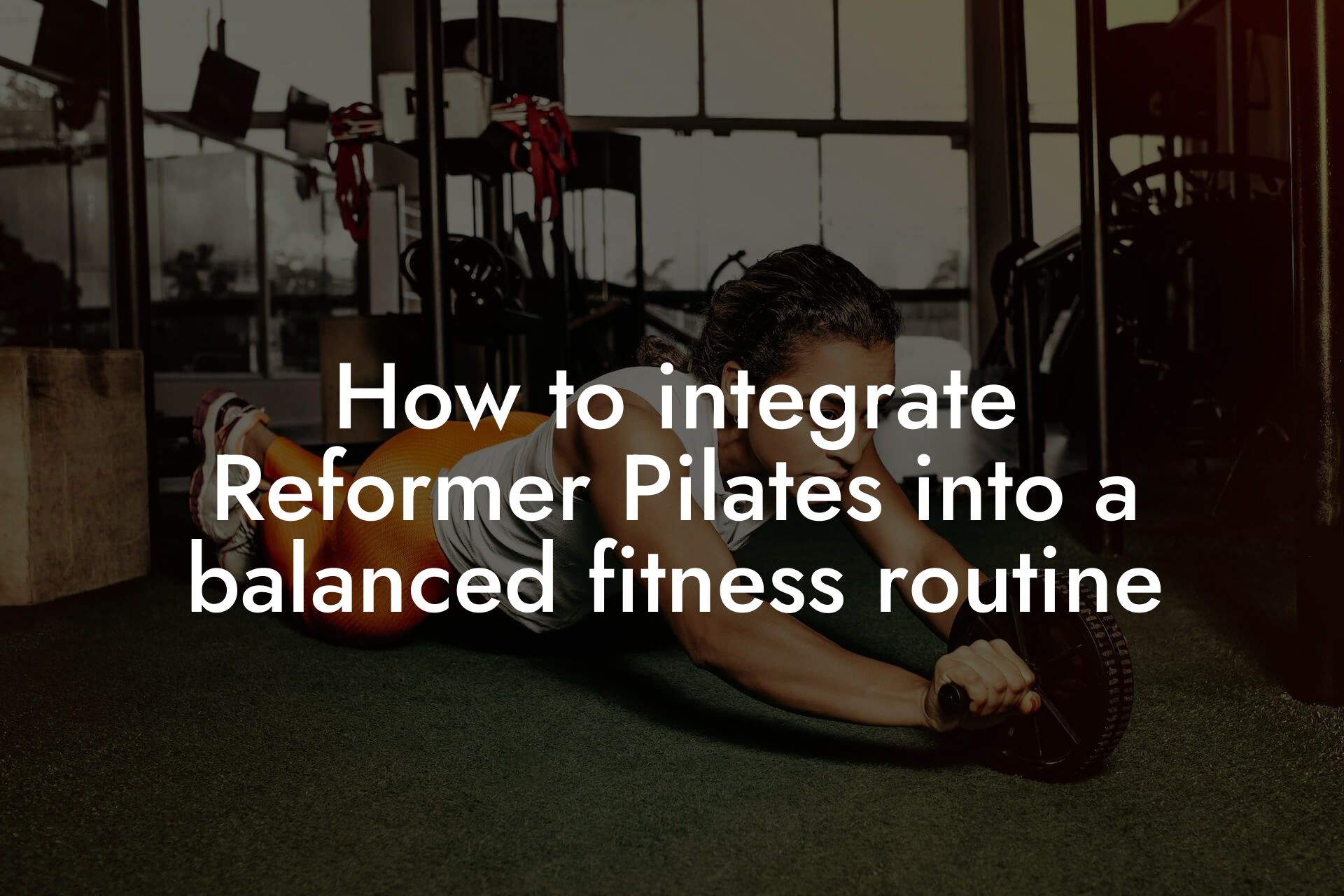As a high-earning professional, you understand the importance of maintaining a healthy and energetic lifestyle to stay on top of your game. Reformer Pilates is an excellent way to improve your physical appearance, body fat, physique, and bone density, but it requires sustained energy levels to get the most out of your workouts. A well-planned nutrition strategy is essential to fuel your body for optimal performance. In this article, we'll explore the best nutrition strategies for sustained energy in Reformer Pilates.
Table of Contents
Understanding Energy Needs for Reformer Pilates
Reformer Pilates is a low-impact, yet physically demanding exercise that requires a combination of strength, endurance, and flexibility. A typical Reformer Pilates session can last anywhere from 30 to 60 minutes, and it's essential to maintain a consistent energy level throughout the workout. To do this, you need to understand your energy needs and how to fuel your body accordingly.
The primary source of energy for Reformer Pilates is carbohydrates, which are broken down into glucose and stored in the muscles and liver as glycogen. When you exercise, your body uses glycogen as a quick source of energy. However, if you don't replenish your glycogen stores, you may experience fatigue, decreased performance, and increased risk of injury.
Pre-Workout Nutrition for Sustained Energy
To optimize your energy levels for Reformer Pilates, it's essential to fuel your body with the right nutrients before your workout. Aim to eat a balanced meal or snack that includes complex carbohydrates, lean protein, and healthy fats 1-3 hours before your session. Here are some examples of pre-workout meals and snacks:
- Oatmeal with banana, almond butter, and honey
- Whole-grain toast with avocado and scrambled eggs
- Greek yogurt with berries and granola
- Smoothie bowl with spinach, banana, almond milk, and chia seeds
Hydration for Optimal Performance
Adequate hydration is critical for optimal performance in Reformer Pilates. Water makes up approximately 60% of your body weight and plays a crucial role in regulating body temperature, transporting nutrients, and removing waste products. Even mild dehydration can lead to fatigue, decreased strength, and poor performance.
Aim to drink at least 8-10 glasses of water per day, and make sure to drink water before, during, and after your Reformer Pilates session. You can also consume electrolyte-rich drinks like coconut water or sports drinks to replenish lost electrolytes.
Electrolytes and Reformer Pilates
Electrolytes are essential minerals that regulate various bodily functions, including nerve and muscle function. During Reformer Pilates, you lose electrolytes through sweat, which can lead to muscle cramps, fatigue, and decreased performance. The primary electrolytes lost during exercise are sodium, potassium, calcium, and magnesium.
To replenish electrolytes, consume electrolyte-rich foods and drinks, such as:
- Bananas (potassium)
- Coconut water (potassium, sodium)
- Avocados (potassium)
- Nuts and seeds (magnesium, calcium)
Post-Workout Nutrition for Recovery
After your Reformer Pilates session, it's essential to refuel your body with the right nutrients to aid in recovery. Aim to consume a balanced meal or snack that includes carbohydrates, protein, and healthy fats within 30-60 minutes after your workout. This helps to replenish glycogen stores, repair muscle tissue, and reduce muscle soreness.
Examples of post-workout meals and snacks include:
- Smoothie with banana, protein powder, almond milk, and spinach
- Grilled chicken breast with sweet potato and steamed vegetables
- Whole-grain crackers with almond butter and banana slices
Macro-Nutrient Ratios for Reformer Pilates
To optimize your energy levels for Reformer Pilates, it's essential to understand the ideal macro-nutrient ratios for your body. A general guideline is to consume:
- 55-65% of daily calories from complex carbohydrates
- 15-20% of daily calories from lean protein
- 20-25% of daily calories from healthy fats
However, everyone's nutritional needs are different, and it's essential to consult with a registered dietitian or nutritionist to determine your individual macro-nutrient ratios.
Supplements for Sustained Energy
While a balanced diet provides the foundation for sustained energy, certain supplements can help optimize your energy levels for Reformer Pilates. Some popular supplements include:
- Creatine monohydrate: Increases muscle strength and endurance
- Beta-Alanine: Delays fatigue and improves high-intensity exercise performance
- Branched-Chain Amino Acids (BCAAs): Reduces muscle soreness and fatigue
- Adaptogenic herbs like ashwagandha and rhodiola: Help regulate stress and improve energy levels
However, always consult with a healthcare professional before adding any new supplements to your regimen.
In conclusion, a well-planned nutrition strategy is essential for sustained energy in Reformer Pilates. By understanding your energy needs, fueling your body with the right nutrients, staying hydrated, and replenishing electrolytes, you can optimize your performance and achieve your fitness goals. Remember to consult with a registered dietitian or nutritionist to determine your individual nutritional needs and create a personalized nutrition plan.
At Tano Performance Group, we understand the importance of nutrition and exercise in achieving optimal physical performance. Our DEXA machine provides a comprehensive body assessment, giving you the information you need to take your fitness to the next level. Combine our expertise with a well-planned nutrition strategy, and you'll be on your way to achieving your goals in no time.
Frequently Asked Questions
What is the importance of nutrition in Reformer Pilates?
Nutrition plays a crucial role in Reformer Pilates as it provides the necessary fuel for energy production, supports muscle function, and aids in recovery. A well-planned diet can help improve performance, reduce fatigue, and enhance overall physical fitness.
How does nutrition impact energy levels during Reformer Pilates?
Nutrition has a direct impact on energy levels during Reformer Pilates. A diet rich in complex carbohydrates, lean proteins, and healthy fats provides sustained energy, while a diet high in sugar and unhealthy fats can lead to energy crashes and decreased performance.
What are the key nutrients for sustained energy in Reformer Pilates?
The key nutrients for sustained energy in Reformer Pilates include complex carbohydrates, lean proteins, healthy fats, vitamins B and C, iron, and electrolytes. These nutrients work together to provide energy, support muscle function, and aid in recovery.
How can I ensure I'm getting enough complex carbohydrates?
To ensure you're getting enough complex carbohydrates, focus on whole, unprocessed foods such as brown rice, whole wheat bread, quinoa, fruits, and vegetables. Aim to include complex carbohydrates in every meal to provide sustained energy throughout your Reformer Pilates workout.
What is the role of lean protein in Reformer Pilates?
Lean protein plays a crucial role in Reformer Pilates as it helps to build and repair muscle tissue, support muscle function, and aid in recovery. Include lean protein sources such as chicken, fish, tofu, and legumes in your diet to support your Reformer Pilates workout.
How can I incorporate healthy fats into my diet?
Incorporate healthy fats into your diet by including sources such as nuts, seeds, avocados, and olive oil in your meals. Healthy fats provide energy, support hormone function, and aid in the absorption of vitamins and minerals.
What are the best sources of vitamins B and C for energy production?
The best sources of vitamins B and C for energy production include whole grains, lean meats, fish, fruits, and vegetables. These vitamins play a crucial role in energy production, nerve function, and immune function.
How does iron deficiency impact Reformer Pilates performance?
Iron deficiency can significantly impact Reformer Pilates performance by reducing energy levels, decreasing endurance, and increasing fatigue. Include iron-rich foods such as red meat, spinach, and beans in your diet to support Reformer Pilates performance.
What is the importance of electrolytes in Reformer Pilates?
Electrolytes play a crucial role in Reformer Pilates as they help to regulate fluid balance, nerve function, and muscle contractions. Include electrolyte-rich foods such as bananas, dates, and coconut water in your diet to support Reformer Pilates performance.
How can I stay hydrated during Reformer Pilates?
Stay hydrated during Reformer Pilates by drinking plenty of water before, during, and after your workout. Aim to drink at least 8-10 glasses of water per day and include electrolyte-rich drinks such as coconut water to replenish lost electrolytes.
What are the best pre-workout snacks for Reformer Pilates?
The best pre-workout snacks for Reformer Pilates include bananas, dates, energy bars, and trail mix. These snacks provide a quick source of energy, support muscle function, and aid in hydration.
How can I prevent energy crashes during Reformer Pilates?
Prevent energy crashes during Reformer Pilates by eating a balanced meal or snack 1-2 hours before your workout, staying hydrated, and avoiding sugary and caffeinated drinks.
What are the best post-workout snacks for Reformer Pilates?
The best post-workout snacks for Reformer Pilates include protein shakes, Greek yogurt, fruits, and nuts. These snacks help to aid in recovery, support muscle repair, and replenish energy stores.
How can I support muscle recovery after Reformer Pilates?
Support muscle recovery after Reformer Pilates by including protein-rich foods and drinks in your diet, staying hydrated, and getting adequate rest and sleep. This helps to aid in muscle repair, reduce muscle soreness, and improve overall physical fitness.
Can I follow a vegan or vegetarian diet and still perform well in Reformer Pilates?
Yes, it is possible to follow a vegan or vegetarian diet and still perform well in Reformer Pilates. Focus on including plant-based sources of protein, complex carbohydrates, and healthy fats in your diet to support energy production and muscle function.
How can I ensure I'm getting enough calories for Reformer Pilates?
Ensure you're getting enough calories for Reformer Pilates by tracking your daily caloric intake, eating frequent meals and snacks, and including calorie-dense foods such as nuts, seeds, and dried fruits in your diet.
What are the best beverages for hydration during Reformer Pilates?
The best beverages for hydration during Reformer Pilates include water, coconut water, and sports drinks. These beverages help to replenish lost electrolytes, regulate fluid balance, and support muscle function.
How can I avoid dehydration during Reformer Pilates?
Avoid dehydration during Reformer Pilates by drinking plenty of water before, during, and after your workout, monitoring your urine output, and avoiding sugary and caffeinated drinks.
What are the common nutrition mistakes to avoid in Reformer Pilates?
The common nutrition mistakes to avoid in Reformer Pilates include not eating enough, not staying hydrated, consuming high-sugar and high-caffeine drinks, and not including enough complex carbohydrates and lean protein in your diet.
How can I create a personalized nutrition plan for Reformer Pilates?
Create a personalized nutrition plan for Reformer Pilates by consulting with a registered dietitian or nutritionist, tracking your daily food intake, and monitoring your energy levels and performance during workouts.
What are the benefits of working with a registered dietitian or nutritionist for Reformer Pilates?
The benefits of working with a registered dietitian or nutritionist for Reformer Pilates include personalized nutrition planning, improved performance, enhanced recovery, and optimal overall physical fitness.
How can I incorporate Reformer Pilates into my busy schedule?
Incorporate Reformer Pilates into your busy schedule by scheduling your workouts in advance, finding a Reformer Pilates studio near your work or home, and incorporating online Reformer Pilates classes into your routine.
What are the benefits of incorporating Reformer Pilates into my fitness routine?
The benefits of incorporating Reformer Pilates into your fitness routine include improved core strength, increased flexibility, enhanced posture, and reduced muscle soreness and injury risk.
Here are some related articles you might love...
- Reformer Pilates for injury prevention and rehabilitation
- Reducing body fat for improved Reformer Pilates results
- How to integrate Reformer Pilates into a balanced fitness routine
- Maintaining muscle tone and flexibility with Reformer Pilates
- How body composition impacts Reformer Pilates performance
- Recovery strategies for Reformer Pilates practitioners
- Bone density and its role in Reformer Pilates practice
- Using DEXA scans to optimize Reformer Pilates training
- The importance of core strength in Reformer Pilates
Zak Faulkner
Zak Faulkner is a leading authority in the realm of physical health and body composition analysis, with over 15 years of experience helping professionals optimise their fitness and well-being. As one the experts behind Tano Performance Group, Zak has dedicated his career to providing in-depth, science-backed insights that empower clients to elevate their physical performance and overall health.
With extensive knowledge of DEXA technology, Zak specializes in delivering comprehensive body assessments that offer precise data on body fat, muscle mass, bone density, and overall physique. His expertise enables individuals to make informed decisions and achieve their fitness goals with accuracy and confidence. Zak’s approach is rooted in a deep understanding of human physiology, combined with a passion for helping clients unlock their full potential through personalised strategies.
Over the years, Zak has earned a reputation for his commitment to excellence, precision, and client-focused service. His guidance is trusted by top professionals who demand the best when it comes to their health. Whether advising on fitness programs, nutritional strategies, or long-term wellness plans, Zak Faulkner’s insights are a valuable resource for anyone serious about taking their health and fitness to the next level.
At Tano Performance Group, Zak continues to lead our Content Team revolutionising how professionals approach their physical health, offering unparalleled expertise that drives real results.




